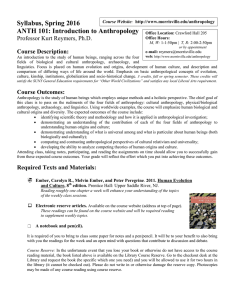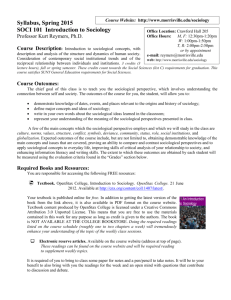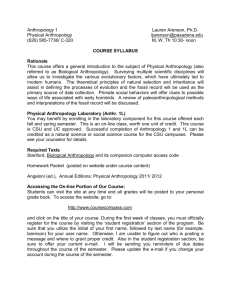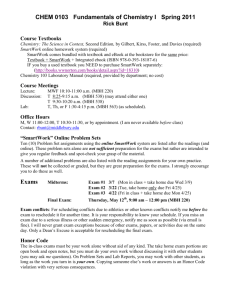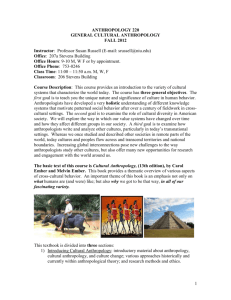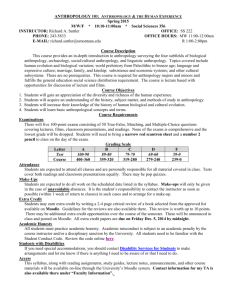ANTH 101: Introduction to Anthropology
advertisement
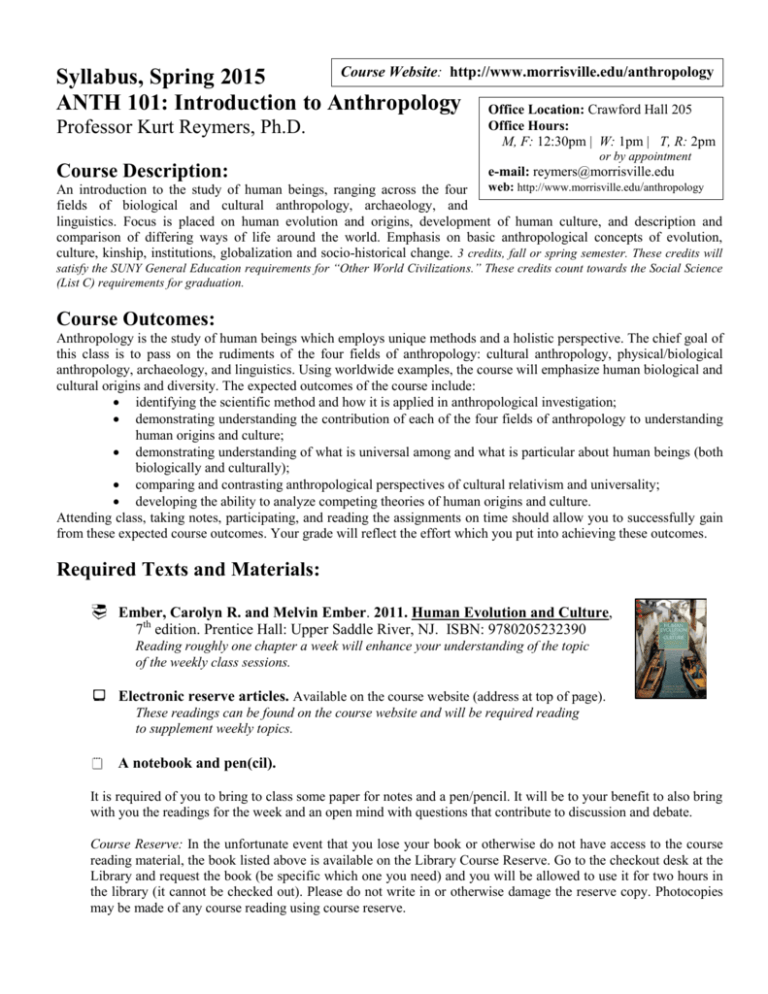
Course Website: http://www.morrisville.edu/anthropology Syllabus, Spring 2015 ANTH 101: Introduction to Anthropology Office Location: Crawford Hall 205 Professor Kurt Reymers, Ph.D. Office Hours: M, F: 12:30pm | W: 1pm | T, R: 2pm Course Description: or by appointment e-mail: reymers@morrisville.edu web: http://www.morrisville.edu/anthropology An introduction to the study of human beings, ranging across the four fields of biological and cultural anthropology, archaeology, and linguistics. Focus is placed on human evolution and origins, development of human culture, and description and comparison of differing ways of life around the world. Emphasis on basic anthropological concepts of evolution, culture, kinship, institutions, globalization and socio-historical change. 3 credits, fall or spring semester. These credits will satisfy the SUNY General Education requirements for “Other World Civilizations.” These credits count towards the Social Science (List C) requirements for graduation. Course Outcomes: Anthropology is the study of human beings which employs unique methods and a holistic perspective. The chief goal of this class is to pass on the rudiments of the four fields of anthropology: cultural anthropology, physical/biological anthropology, archaeology, and linguistics. Using worldwide examples, the course will emphasize human biological and cultural origins and diversity. The expected outcomes of the course include: identifying the scientific method and how it is applied in anthropological investigation; demonstrating understanding the contribution of each of the four fields of anthropology to understanding human origins and culture; demonstrating understanding of what is universal among and what is particular about human beings (both biologically and culturally); comparing and contrasting anthropological perspectives of cultural relativism and universality; developing the ability to analyze competing theories of human origins and culture. Attending class, taking notes, participating, and reading the assignments on time should allow you to successfully gain from these expected course outcomes. Your grade will reflect the effort which you put into achieving these outcomes. Required Texts and Materials: Ember, Carolyn R. and Melvin Ember. 2011. Human Evolution and Culture, 7th edition. Prentice Hall: Upper Saddle River, NJ. ISBN: 9780205232390 Reading roughly one chapter a week will enhance your understanding of the topic of the weekly class sessions. Electronic reserve articles. Available on the course website (address at top of page). These readings can be found on the course website and will be required reading to supplement weekly topics. A notebook and pen(cil). It is required of you to bring to class some paper for notes and a pen/pencil. It will be to your benefit to also bring with you the readings for the week and an open mind with questions that contribute to discussion and debate. Course Reserve: In the unfortunate event that you lose your book or otherwise do not have access to the course reading material, the book listed above is available on the Library Course Reserve. Go to the checkout desk at the Library and request the book (be specific which one you need) and you will be allowed to use it for two hours in the library (it cannot be checked out). Please do not write in or otherwise damage the reserve copy. Photocopies may be made of any course reading using course reserve. Grades: Attendance and Participation (10% of final grade) You are allowed three absences available to you without penalty, but unused absences are credited toward your participation. See the Class Policies section for more information regarding attendance. Participation may involve voluntary and involuntary contributions in class, attending tutoring sessions, seeing my during my office hours to discuss the course, or other behaviors indicating your involvement in the course. Online Activities (20% of final grade) Each week, activities will be put online and you must send your answers related to these activities directly to the professor. These activities will relate to readings from the “Human Evolution” textbook and/or other readings assigned in class and available through the course website. Answers should be completed individually. Online activities will be posted weekly and are due on Friday at 5pm. They CANNOT be made up after the due date. The lowest online activity grade will be dropped at the end of the semester. Research Assignments (30% of final grade) Written reports on recent anthropological research will be assigned during the semester. The reports will be fivepage typed papers designed to enhance research skills and show your understanding of the themes of evolution and culture that we are covering in the course. They will be graded on a letter basis. Exams (total of 40% of final grade) Three exams will be given during the course, and there will be a final exam - study weekly with the schedule provided, use the review notes and web materials, and be prepared to get the most out of this largest portion of your grade. You are not allowed to use any books, notes or materials during the exams. You will have the regular class period to complete exams. Each exam is worth ten percent of your final grade. Grade Distribution: 10% of grade: Attendance and Participation 20% of grade: Online Activities 30% of grade: Research Report 40% of grade: Exams (10% each exam) Asking about grades: Grade Converter: (use for any assignment/exam/grade in my classes) Percent / Letter / Grade Point Converter: 93 to 100+ = A = 4.0 83 to 86 = B = 3.0 73 to 76 = C = 2.0 63 to 67 = D = 1.0 62 and below = F = 0.0 90 to 92 = A- = 3.67 80 to 82 = B- = 2.67 70 to 72 = C- = 1.67 87 to 89 = B+ = 3.33 77 to 79 = C+ = 2.33 68 to 69 = D+ = 1.33 Feel free to ask your professor in person about your grade in the course at any point during the semester. However, I may not respond to email messages inquiring about specific grades on semester exams, papers, or (particularly) the final exam. This is due to the fact that email is not a confidential medium. Class Policies: Class Participation and Attendance Attendance: Students should make every attempt to attend all classes. Missing any more than three classes impedes your work and may result in a lower grade. Attendance is taken daily and recorded. The absences allowed are for athletic events, serious and contagious illness or injury, family emergencies, snow days, car accidents, etc. It is expected that the absences allowed will satisfactorily cover the cases where absence is necessary. If they do not, please meet with the instructor during his office hours to explain your case. If you have too many absences and would like to have your case considered, please provide documentation of the reason for your absence, including date, evidence and explanation of the absence, in writing (not by e-mail or verbal agreement). As an incentive for good attendance, for each of the absences you are allowed that go unused, you will earn an extra bonus point toward the final grade. Also, if you attend every class before or after each semester break, one point will be added to your attendance score. Class Policies, cont. Classroom Norms: You are attending class in a college classroom designed specifically to help you seek knowledge. Being on Facebook, Twitter, Instagram, Tumblr, etc., playing games, texting and calls from friends or family, eating, sleeping, reading outside material, working on other classes’ assignments, using a laptop computer outside of class purposes, etc., are examples of unacceptable classroom behavior. Talking in class is ok – however, it should be public, relate directly to the class conversation, should take the form of civilized argument or a relevant question, and should never preempt another speaker (one speaker at a time, please). RESPECT for the space of the classroom (this includes professor and fellow students) and the exercise of SELF-CONTROL is expected from ALL STUDENTS. If the norms of respect are not being observed (for example, if you continually talk to a friend to the point that it disturbs the students around you) the professor reserves the right to take disciplinary action(s) against the offender(s), including but not limited to lowering your grade or the asking you to leave the classroom. Please note that, in general, attendance of college classes is directly correlated to the grades that students receive, despite that it may not be noticeably or regularly enforced. If you want a higher grade, come to class and recognize these guidelines. Tardiness Policy: Arriving late disrupts the class, as does leaving early – people showing up very late (15 minutes or more), or leaving the classroom during class (with the exception of emergencies only) will not be permitted to (re)enter the classroom. Every three instances of tardiness will result in one absence marked on the attendance sheet. Plagiarism Rule: Academic honesty promotes continued academic and occupational success. Maintenance of academic honesty and quality education is the responsibility of both faculty and students. Any written assignment (including all electronic media) submitted by a student must be original authorship. Representation of another’s work as his or her own shall constitute plagiarism. See the student handbook for more information. Plagiarism means theft of intellectual property, obtained from a print or electronic medium. A person has plagiarized if s/he quotes three or more words in sequence from a source and (1) doesn’t use quotation marks (“The quick brown fox…”), and (2) doesn’t identify the source (what is known as “citation”). A person has also plagiarized if s/he records or cites ideas, information, or other material from a source that is not identified, or if the individual paraphrases information from a source that is not acknowledged. The penalty for plagiarism could be failure on the assignment, failure in the course, or even expulsion from the college. Ignorance of these rules is not an excuse for plagiarism. Late/Make-up Assignment/Extra Credit Policy: Exams: Make-up exams will not be given, unless you make arrangements with me more than 48 hours (2 days) in advance of the exam. If you miss an exam without making arrangements to make it up, you will receive NO CREDIT for that particular exam. Quizzes: You cannot make up any online quizzes after they have been taken down from the website. There are no exceptions to this rule. Quizzes can be submitted at any time before the due date/time. If you cannot access the website to take the quiz, you may take the quiz during my office hours prior to the due date. Papers: Written assignments will be due as scheduled, but may be turned in up to ONE WEEK after the due date with a penalty of ONE LETTER GRADE (or 10 points on a 100 point scale). No written assignments will be accepted after the one week late period. Extra credit: I do not give extra credit assignments to individuals – any extra credit will be on a class-wide basis (and there is no guarantee of ANY extra credit assignments in any given semester). Students with Learning and/or Physical Challenges If you are a student with a documented disability, who wishes to use academic accommodations you should (1) speak with me during the first two weeks of class. This two-week time frame is to encourage students to arrange accommodations early in the semester. Students with disabilities may arrange accommodations at any point during the semester. (2) Talk with David Symonds, Coordinator of Services for Students with Disabilities to arrange your test accommodations. You may reach David by e-mail at symondda@morrisville.edu, or visit him (by appointment please) at his office in the Library. (3) Using Test Accommodations: If you wish to use test accommodations for an exam please speak with me the class before each exam. Doing this will help me accommodate you. All tests must be completed the same day the test is scheduled. Any other arrangements must be made by agreement between the student and the instructor. ANTH 101 – Introduction to Anthropology, Spring 2015 Course Schedule v.1 Note that this schedule is tentative and subject to change – check the website to find out what changes are made. http://www.morrisville.edu/anthropology Introduction 1. Jan 14, 16: What is Anthropology? Introductory Notes; Founding Concepts read: Ember textbook, Chapter 1 Syllabus & Chapter 1 quiz in class Fri Aug 29 I: Biological Anthropology 2. Jan 19, 21, 23: Genetics and Evolution read: Ember textbook, Chapter 3 do: online activity #1 Online activity 1 due no later than 5pm Fri 3. Jan 26, 28, 30: The Early Origins of Man read: Ember textbook, Chapter 6 do: online activity #2 Online activity 2 due no later than 5pm Fri * Exam 1: Fri. Jan 30 4. Feb 2, 4, 6: The Emergence of Homo sapiens read Ember textbook, Chapter 7 do: online activity #3 Online activity 3 due no later than 5pm Fri 5. Feb 9, 11, 13: Variation in Homo sapiens read: Ember textbook, Chapter 4 do: online activity #4 Online activity 4 due no later than 5pm Fri II. Archaeology and Linguistics 6. Feb 16, 18, 20: How We Discover the Past read: Ember textbook, Chapter 2 do: online activity #5 Online activity 5 due no later than 5pm Fri 7. Feb 23, 25, 27: Exam week * Exam 2: Weds. Feb 25 Questions? e-mail reymers@morrisville.edu 8. Mar 2, 4, 6: Domestication & Civilization read: Ember textbook, Chapter 8 do: online activity #6 Online activity 6 due no later than 5pm Fri 9. Mar 9, 11, 13: Civilization & Language read Ember textbook, Chapter 10 do: online activity #7 Online activity 7 due no later than Fri ~ SPRING BREAK Mar 16-20 ~ III. Ethnology 10. Mar 23, 25, 27: The Study of Cultural Institutions read: Ember textbook, Chapter 9 do: online activity #8 Online activity 8 due no later than 5pm Fri 11. Mar 30, Apr 1, 3: Exam Week * Exam 3: Fri. Apr 3 12. Apr 6, 8, 10: Cultural Institutions I: Family Marriage and Kinship read: Ember textbook, Chapter 14 do: online activity #9 Online activity 9 due no later than 5pm Fri 13. Apr 13, 15, 17: Cultural Institutions II: Trade Food Production and Economics read: Ember textbook, Chapter 11 do: online activity #10 Online activity 10 due no later than 5pm Fri 14. Apr 20, 22, 24: Cultural Institutions III: Power Stratification and Political Organization read: Ember textbook, Chapter 12 15. Apr 27, 29, May 1: Cultural Institutions IV: God Religion, Magic and Witchcraft read: Ember textbook, Chapter 16 16. May 4: Final Exam
